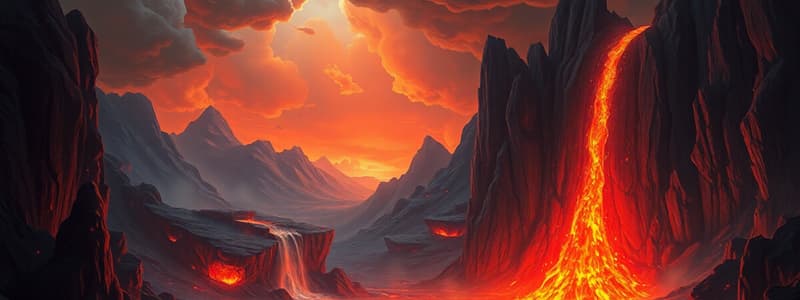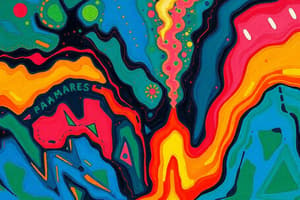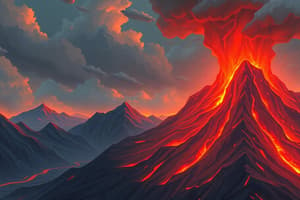Podcast
Questions and Answers
Qual destes produtos vulcânicos é uma rocha derretida que flui de um vulcão?
Qual destes produtos vulcânicos é uma rocha derretida que flui de um vulcão?
- Gases vulcânicos
- Cinzas
- Material piroclástico
- Lava (correct)
Os cones de cinzas são formados pela mistura de lava e materiais piroclásticos.
Os cones de cinzas são formados pela mistura de lava e materiais piroclásticos.
False (B)
Nomeie um tipo de vulcão que é composto por camadas alternadas de lava e material piroclástico.
Nomeie um tipo de vulcão que é composto por camadas alternadas de lava e material piroclástico.
Vulcão composto ou estratovulcão
Os _______ são fluxos rápidos de gás quente e cinzas que causam destruição significativa.
Os _______ são fluxos rápidos de gás quente e cinzas que causam destruição significativa.
Associe os tipos de vulcões com suas características:
Associe os tipos de vulcões com suas características:
Qual fator NÃO afeta diretamente a explosividade de uma erupção vulcânica?
Qual fator NÃO afeta diretamente a explosividade de uma erupção vulcânica?
Os gases vulcânicos podem causar problemas respiratórios.
Os gases vulcânicos podem causar problemas respiratórios.
Como o monitoramento científico pode ajudar em relação a atividades vulcânicas?
Como o monitoramento científico pode ajudar em relação a atividades vulcânicas?
Qual tipo de magma é menos explosivo devido ao seu baixo teor de sílica?
Qual tipo de magma é menos explosivo devido ao seu baixo teor de sílica?
Todo o magma é altamente viscoso e explosivo.
Todo o magma é altamente viscoso e explosivo.
Qual é o efeito da presença de voláteis como água e dióxido de carbono no ponto de fusão das rochas?
Qual é o efeito da presença de voláteis como água e dióxido de carbono no ponto de fusão das rochas?
Erupções __________ geralmente ocorrem com magma basáltico.
Erupções __________ geralmente ocorrem com magma basáltico.
Associe os tipos de magma com suas características:
Associe os tipos de magma com suas características:
Flashcards
Vulcanismo
Vulcanismo
É um processo geológico fundamental que envolve a erupção de rocha fundida, cinzas e gases do interior da Terra para a superfície. É responsável por moldar a superfície da Terra, criar paisagens e afetar a atmosfera.
Magma
Magma
É rocha fundida encontrada dentro da crosta terrestre ou manto. Forma-se pelo derretimento de rochas devido às altas temperaturas e pressões. A composição química específica afeta o ponto de fusão.
Magma Basáltico
Magma Basáltico
Um tipo de magma com baixo teor de sílica, fluído, que resulta em erupções menos explosivas.
Magma Andésico
Magma Andésico
Signup and view all the flashcards
Magma Riolítico
Magma Riolítico
Signup and view all the flashcards
Lava
Lava
Signup and view all the flashcards
Materiais Piroclásticos
Materiais Piroclásticos
Signup and view all the flashcards
Vulcões em Escudo
Vulcões em Escudo
Signup and view all the flashcards
Cones de Cinzas
Cones de Cinzas
Signup and view all the flashcards
Vulcões Compostos (Estratovulcões)
Vulcões Compostos (Estratovulcões)
Signup and view all the flashcards
Caldeira
Caldeira
Signup and view all the flashcards
Fluxos Piroclásticos
Fluxos Piroclásticos
Signup and view all the flashcards
Lahars
Lahars
Signup and view all the flashcards
Study Notes
Introduction to Volcanism
- Volcanism is a process involving the eruption of molten rock, ash, and gases from Earth's interior onto the surface.
- It's a fundamental geological process shaping Earth's surface, creating landforms and affecting the atmosphere.
Magma Formation
- Magma is molten rock within Earth's crust or mantle.
- Its formation results from the melting of rocks due to high temperatures and pressures.
- Certain chemical compositions increase the melting point of rocks.
- Partial melting is a common process where not all the rock melts.
- Presence of volatiles (water, carbon dioxide) lowers the melting point of rocks.
Types of Magmas
- Magmas vary in composition based on the proportion of silica (SiO2), affecting their viscosity and explosivity.
- Basaltic magma: low silica content, fluid, less explosive eruptions
- Andesitic magma: intermediate silica content, viscous, explosive eruptions possible
- Rhyolitic magma: high silica content, highly viscous, extremely explosive eruptions
Volcanic Eruptions
- Eruptions can be effusive (flowing lava) or explosive (pyroclastic material).
- Effusive eruptions typically occur with basaltic magma.
- Explosive eruptions occur when highly viscous magma traps gases, causing pressure buildup.
Volcanic Products
- Lava: molten rock flowing from a volcano
- Pyroclastic materials: solid fragments ejected during an eruption (ash, lapilli, volcanic bombs)
- Volcanic gases: primarily water vapor, carbon dioxide, sulfur dioxide, and other gases
Volcanic Landforms
- Shield volcanoes: broad, gently sloping cones formed by fluid basaltic lava flows (e.g., Mauna Loa)
- Cinder cones: small, steep-sided cones formed from pyroclastic material
- Composite volcanoes (stratovolcanoes): large, cone-shaped volcanoes with alternating layers of lava and pyroclastic material (e.g., Mount Fuji)
- Caldera: a large, basin-shaped depression formed by the collapse of a volcanic summit following a massive eruption (e.g., Yellowstone)
- Lava plateaus: extensive, flat areas formed by successive lava flows
Factors Affecting Eruptions
- Magma composition: determines viscosity and explosivity
- Magma temperature: higher temperature magma flows more easily
- Amount of dissolved gases: gases contribute to pressure and explosivity
- Volcanic conduits: channels that magma travels through to reach the surface
Volcanic Hazards
- Lava flows: destroy property and infrastructure
- Pyroclastic flows: fast-moving currents of hot gas and ash, causing significant destruction
- Lahars: volcanic mudflows formed from the mixing of ash and water
- Volcanic gases: cause respiratory problems and acid rain
- Volcanic ash: disrupts air travel and damages infrastructure
Monitoring and Prediction
- Scientific monitoring of volcanoes involves observing ground deformation, gas emissions, seismic activity, and thermal anomalies.
- These observations help predict potential eruptions and mitigate associated risks.
Volcanic Benefits
- Fertile soils: volcanic ash and deposits create nutrient-rich soils for agriculture.
- Geothermal resources: volcanic activity provides heat for power generation.
Studying That Suits You
Use AI to generate personalized quizzes and flashcards to suit your learning preferences.



